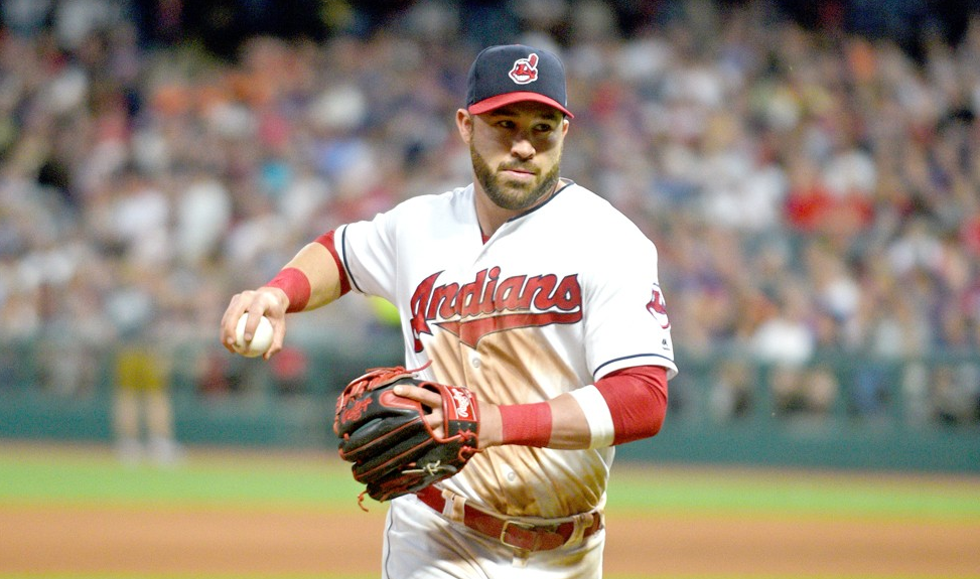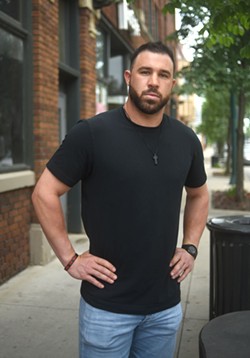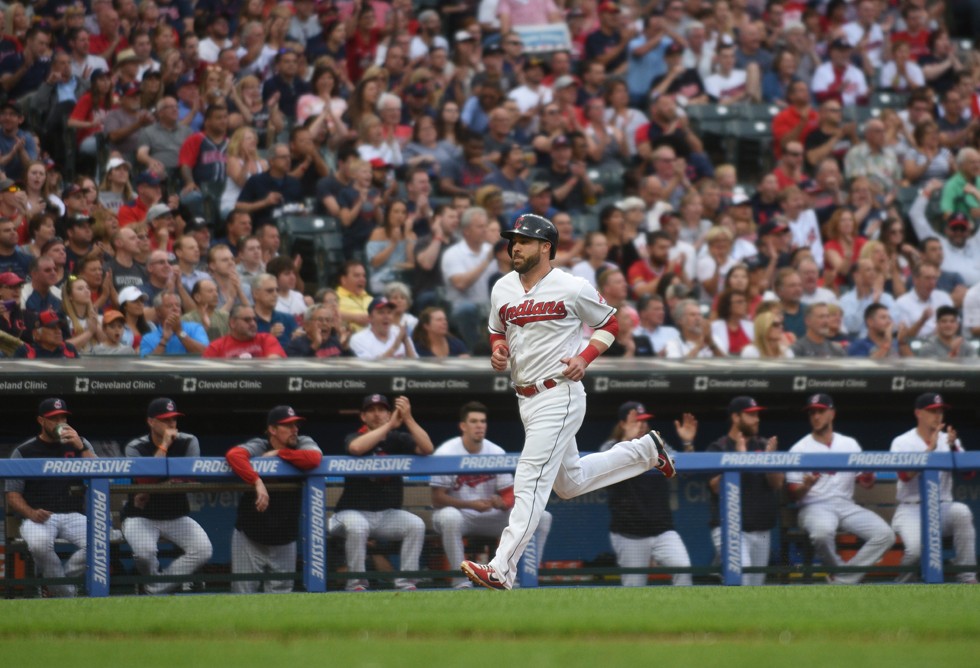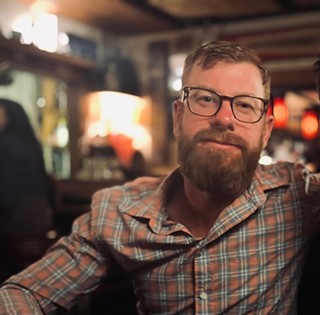Hey, have you heard Jason Kipnis is from Chicago?
"If you watched any of the [World Series] games last year, they must have said it a hundred times," Kipnis says over lunch at Banter in Detroit Shoreway one recent June afternoon. "They said it every 20 minutes."
He's explaining the origins of "Let's Do This, Cleveland," his first-person piece published by The Player's Tribune back on April 3, the day the reigning American League champions began the 2017 season in Texas with an 8-5 win.
Part World Series exegesis — including his thoughts on blowing a 3-1 lead, the rain delay, and a snapshot of his mental and physical state in the immediate aftermath of Game 7 when he returned to his offseason home in Chicago — and part call to arms, the essay hewed a nimble tightrope of looking back and looking forward, of imploring Cleveland to get behind the team without sounding like a direct complaint about how many butts are or are not in the seats.
"I feel like this team is really just getting started," it read. "This is a new season. A new team. And, to be honest ... we're a better team this year than we were last year. I'm hoping all of Cleveland feels the same way, and is ready to make a run at history this year ... starting today. Don't wait until September, or the playoffs. Come along for the ride from the very beginning. I promise you ... if we do what I think we can do this season, it will be all the more sweet to look back on and tell your grandkids about if you were a part of this thing from Day One.
"I had that story to tell, and I'm happy that in this instance people got a look behind the scenes," Kipnis says of the result of what he described as a pretty organic process: He sat down and talked to a writer, the writer put it to paper, and Kipnis edited it when he was done. "I did take a bunch of stuff out though. [The writer] had a bunch of 'bros' and 'dudes' in there. I was like, 'I'm not [Nick] Swisher. I don't talk like that.'"
Attendance has been a hobbyhorse for otherwise baseball-illiterate local sports talk radio hosts and fans in recent years, especially during last season's sprint to October. It's a touchy subject for a variety of reasons, not least when a player on a multi-million dollar contract addresses it. "It's definitely a fine line," Kipnis says. "If you remember the Chris Perez era, he was, uh, a little more blunt than I was. But we get it; we know it's a lot easier for guys making millions of dollars to, say, go spend 40 bucks on tickets, but we also understand it's more fun for everyone if everyone's there."
There were, of course, some anemic turnstile receipts during 2016 before the packed-house playoff games that brought back memories of the 455-game sellout streak. The kind when you could hear each and every heckle from the furthest corners of the stadium, the kind when you could hear yourself breathe.
"I actually ... Well," Kipnis says before standing up from the table, taking a step back and crouching slightly like he's leading off first base. "There was a game last year, one of those with like 8,000 people or less or whatever. And I was leading off first and I could actually hear Tom Hamilton on the radio echoing from the speakers somewhere. And I hear, 'Kipnis has a biiiig lead at first.' And I look down and I take a step back toward the base. I think the pitcher heard it too. I was like, 'Oh boy, okay.'"
That hasn't been an issue this year. Cleveland fans have held up their end of the bargain: A surge in new season ticket purchases in the offseason soared even higher after the Tribe signed Edwin Encarnacion, and few and far between are the games when the lower bowl isn't full. The Indians crossed one million in attendance after 44 homes games (it took 52 last year) and are on pace to draw two million for the first time since 2008. The team's end of the bargain? That's another question.
"It's been a lot of fun to see. We've noticed the uptick for sure, which makes it all the more frustrating for us because we're spinning our wheels right now and we just want to get back there again," Kipnis says. At this point the Indians are 31-29, one game back of the Twins, in a season of fits and starts that's seen them sweep the world-beating Astros and also barely stave off sweeps by the Royals and Reds, all while winning fewer than half their games in Progressive Field.
They had an off day yesterday, the third in a week or so after going 20 games without a break. Kipnis spent the last one with Lonnie Chisenhall — his best friend on the team and a guy he calls, with or without baseball, a friend for life — in Chisenhall's backyard with his two kids. "I'm Uncle Jason," he says while noshing on a corndog, which would be unremarkable except he's eating it with a fork and knife despite the dish's built-in utensil.
Yesterday he caught Wonder Woman and lunch at Crocker Park and then watched at home as the Cavs lost to the Warriors in Game 5 of the NBA Finals. "I'm learning to make better use of my off days," he says. "I could sit on my couch all day, so I'm trying to make sure I get out of the house at least once."
Tonight they'll begin a three-game series against the Dodgers starting with Cy Young winner Clayton Kershaw. "It's a good test, like the Rockies," he says. "If guys just want to show up, you're going to get your ass kicked by good teams." (They, of course, will lose two out of those three games and Kipnis, after banging two doubles off Kershaw in the first game and probably considering a new pre-game corndog ritual, will miss the next two with nagging neck spasm issues.)
And by now, it's getting to the point in the season when it's not early anymore.
"The fact that no one's pulled away in our division ... we're very fortunate," Kipnis says. "It's a shitty division right now, to be honest, and everyone's beating up on each other. We lose three out of four games and I'm like, 'How far ahead are the Twins now?' and it's like one and half games, and I'm like, 'What?' And we go out and play in the division and we're struggling to avoid being swept by the Royals twice and we're like, 'What the hell is going on?' It's like everyone's waiting for us to make a run."
Indeed.
***
Tito Francona lit into the team pretty well in a team meeting after one of the losses against the Rockies in Colorado. There have been a handful of meetings this year as the Indians struggled to get out of the gate but early June saw a spate of talks. "In the past couple of days I've probably had more meetings than I've had in years," Francona told Cleveland.com's Zack Meisel. The Colorado one was a bit different, according to Kipnis.
"It was much needed, and deservedly so," he says. "It was one of those things where guys were saying things behind the scenes and you're like, 'Tito needs to come in here and say something,' and he does and you're like, 'Whoa, I was kidding, I was kidding.'
"It was real quiet, I'll tell you that. He's installed a lot of trust in the older guys and doesn't want it to get to the point where he has to say something. We police ourselves, we take care of things, so you know when he does speak you've reached a point where it's gone too far. Rarely does he raise his voice or swear too much, but in this one he did both, and he wasn't out of line. I'm not going to give you every detail, but it was basically a wake-up call. There's no fight. We get down early and act like the game's over, and that's absolutely true. Last year we epitomized the theme of fighting back and rising up to the challenge, and there's none of that this year. We're too good to be wasting away opportunities or playing down to the competition. Half of these guys we think are below us have better records than us right now. There was a meeting before the Astros series and he was like, 'Don't forget who we are.' And we cleaned it up and beat the best team in baseball three games in a row and we thought we were fine again, and then we got right back to all the bad things that were going on. This one was like, 'You guys really fucking forgot who we are.'"
Maybe it's not abundantly clear who they are, or at least not reassuring to take stock of who they are right now, but it's clear who they should be. Inconsistent starting pitching has plagued the first half of the season, injuries haven't helped, and prolonged slumps from the Tribe's biggest bats — Lindor, Santana and Kipnis, namely — led to an uneven and frustrating recent stretch. Sure, they're currently in first place in the AL Central and stomped on the Tigers to hit the mid-season break on a high note; and sure, some advanced stats show them performing better than last year's team and better than their record indicates. But things just feel different.
There was a lot of talk about the departure of Mike Napoli and the vacuum of veteran clubhouse leadership it created. Talk to some beat writers and they'll say it's overblown — they're just not playing well; but talk to others and it's a very real concern. Napoli, and Jason Giambi before him, was a mentor to Kipnis. His thoughts on their leadership, and absences, are interesting not just because it had become a hot topic in the midst of a summer stumble but also for how Kipnis views himself as a veteran and where he's at in his career trajectory.
"People talk about missing Napoli or Rajai Davis, and we miss them and they are team guys," Kipnis says. "Team guys just means you care more about winning than your own stuff. We still have all that, but my fear after last season was that everyone's experienced everything now. You haven't won a World Series, but you were there in Game 7 and there are no more surprises, even for the rookies. So there's less you can say and it's not like people are getting complacent, but they think that's just how it is: We can win 14 in a row whenever we want, or we're going to the World Series because we have the same team as last year. We've almost forgotten how hard it was to get there and how hard it is to get back. We've come out of the gate thinking the wrong thing and acting the wrong way."
Kipnis is in his sixth full season in the majors. It's five for Corey Kluber. Michael Brantley is the elder statesman of the clubhouse with eight-ish full years in, though all of last year was lost to injury. There's something different about leadership, according to Kipnis, when the gap between the younger and older guys is slim.
"[Napoli and Giambi], those guys were so good at having a feeling for the team. It's weird: The demographic right now is Brantley, Kluber and myself, we're the veterans of the team. Those other guys had 10-plus years in, and when they spoke you knew it wasn't coming from a place of opinion, it was from experience. You listen closely, because it was all backed up. It loses a little bit when I'm trying to tell a younger guy who's been right next to me in the dugout something, it's tough when we've both experienced it all together. With those guys, there were no Tito meetings — they did it themselves, which I've done in the past, but I started the season on the DL and, for the first three weeks back, it looked like I was still on the DL. Who am I to tell someone to do better when I can't even put the ball in play right now? I got so caught up in trying to contribute something myself, I wasn't fully on the pulse of the team. It took a little while, but I think we're back on track and I think Brantley and Kluber have done a good job saying that's enough of that, cleaning house basically. We're going back to what works. If you don't run it out, you're going to hear about it. If you do something wrong, you're going to hear about it.
"But yeah, guys just haven't been playing good. I'm not playing the way I want to."
He's not, and it's readily apparent. Plus, Kipnis can't quite kick the injury bug. If the rotator cuff is bothering him, he doesn't admit it (though exit velocity and launch angle stats hint it might be). And the neck spasms dipped into the rearview just in time for a hamstring sprain on a recent Saturday night against the Tigers that landed him on the DL once again. He'll limp into the All-Star break nowhere close to resembling the player that twice made the mid-summer classic himself.
***
The World Series was maybe, but hopefully not, a once-in-a-career opportunity, even more so because of the opponent and venue — Hey, have you heard Jason Kipnis is from Chicago? — but he almost missed out on the chance.
In the euphoric on-field celebration after the final out against the Blue Jays in the ALCS, Kipnis and Francisco Lindor ran toward each other near second base and jumped to embrace. Well, at least Kipnis thought they were jumping. Lindor wasn't.
"You have every handshake in the world down but we couldn't coordinate our celebration," Kipnis says.
The second baseman came down hard, his left ankle rolling violently as he landed on Lindor's foot.
"He was like, 'We did it!'
"And I was like, 'My fucking ankle!'
"And he was like, 'We did it!'
"And I was like, 'MY FUCKING ANKLE!'"
Got a little too close to @Lindor12BC during the celebration!! Freak accident but should be good to go by Tuesday! #cantkeepmeoutofthisgame! pic.twitter.com/2DKgpzP0lq
— Jason Kipnis (@TheJK_Kid) October 23, 2016
Kipnis "did the hokey pokey" around the clubhouse celebration and quickly ducked into the trainer's room while the party was still raging. The injury wouldn't become public until the first press availability before the series, and despite the it's-no-big-deal brushoffs from Kipnis and the team, his playing status was a very real question. He feared he might miss all or part of the square-off against the Cubs, and if Game 1 had been scheduled any earlier than that Tuesday, he wouldn't have been able to play. Anyone who saw the picture of his ankle, bulbous and blue, tweeted out by an MLB reporter on the morning of the game would have no trouble believing that.
ICYMI #Indians @TheJK_Kid grade 2 ankle sprain looks nasty! Said nothing would keep him from playing #WorldSeries #painkillers #adrenaline pic.twitter.com/tQ0LOINych
— Heidi Watney (@HeidiWatney) October 25, 2016
"I had to tape my ankle for every single game; I don't normally do that. And I had a needle in the ankle to numb it every game and a needle in the butt for Toradol every game, so I kind of felt great," he says, kind of laughing. "I got hit by a pitch in the ribs in one of the games in Chicago and I didn't flinch. I turned around and asked the ump if it hit me. I couldn't feel anything."
Maybe not physically, but emotionally. Wrigley Field was dotted with everyone he grew up with — teachers, friends, classmates, neighbors — all wearing Cubs jerseys.
"It was a surreal moment," Kipnis says. "I was hearing I was a traitor and I was going to be the hometown villain, that I would have crushed everyone if we would have won. That would have been awesome; nothing would have made me happier."
That, of course, didn't happen. And Kipnis, at some point, had to return to Cubbie Central and his apartment where he lives in the off-season. He waited an extra week longer than he normally would have to return home, to let the parade happen and some of the excitement die down.
"Uh, it didn't die down," Kipnis says. "Cubs stuff in every damn window."
He hunkered down in his apartment for the most part, surrounded by a close ring of friends and his family. His brothers, for instance, made just about every game during the playoff run — both Cubs fans, both now the biggest Indians fans — hoping that the Cubs' 108-year World Series drought would notch another year.
"It sucked," Kipnis says. "Around Thanksgiving I took the train to O'Hare for a flight for a family vacation. It was like 6 a.m. and people were saying, 'Go Cubs go.' I put my hat down and my headphones on and let that one go. I got to the airport and was doing the self-ticket check and some guy said, 'Maybe next year.' I just go, 'Fuck you,' and turned back around. I'm like, 'I didn't handle that well. If that's how I'm going to be ... I thought I had prepared responses, but it was best to just avoid it after that for awhile."
Kipnis has a similar philosophy about social media. Five years or so ago, for instance, he told a fan to fuck off. "That was probably a bad move," Kipnis laughs. "I was standing up for my team and some people jump on your side and other people are telling you to take the high road and you're like, 'Shit, you're right.' You want all this access and you want to know who I am, but you say something wrong and you're going to get who I am, then I'm the bad guy."
Chances are pretty good that if you've tweeted something at Kipnis since then — an insult, a pat on the back, whatever — he's seen it. Because for a long, long time Kipnis checked every single mention on Twitter, because he's apparently a glutton for punishment.
"I don't check every single one now," Kipnis says. "I'll browse. It affected me in a bad way for a long time; it's weird to know what everyone is thinking and to know they're saying it at you. It's the ones that comment all that crap ... you're just like, 'Why do I care what they say?'"
While that's not surprising, it does represent a shift in his attitude toward giving access to his personal life on social media.
"I was one of the ones early on who thought how cool it was to be able to get to know the athletes like that for fans. That bridge wasn't there when we were kids. But now you guys have too much access," he says. "I try to keep my private life out of it because even when you post about a restaurant or fishing or something, every response is about blowing a 3-1 lead or hoping I get traded. And before, when I read everything, after a bad game I was like, 'All right, fuck, let's get through these,' and after good games it was positive reinforcement. I try to check after only good games now, more or less. I'm definitely addicted, and I used to love it, but my relationship with social media is on thin ice now."
***
Speaking of tweets, you might have seen this one: "Almost all of my teammates support Trump." So said Trevor Bauer back in February. You don't have to have insider access to know that Bauer was spreading fake news.
"I can reassure you I wasn't one of those guys. I have a soul," Kipnis says. "I didn't even vote this year. Of my few political statements, and I won't get too much into that stuff, [Trump's] policies could be beneficial or not, it's him as a person, it's embarrassing to me.
"I know [Bauer's] looking at some things like tax brackets and we're definitely the one-percent. And that was definitely a thing like, 'You need to post less, do less,' " Kipnis says of the rest of the Bauer political stream with a laugh. "We'll hear about things the next day or whatever if we don't see it. Not everyone's ready to know about Trevor the way we know Trevor. He's a special guy and it's taken years to earn his friendship."
In that regard, the Indians clubhouse is like every other workplace in America, at least in the way that the presidency has entered daily chatter.
"It's a conversation to pass the day," Kipnis says. "I know some guys who are very pro Trump and some very against him, but at no point does that ever screw with anything or become a fight. It's something you're talking about at lunch or whatever, but then every conversation ends with, 'You're an idiot. Okay, let's go outside and play catch.'"
It's also unique in other ways, with an overlapping demographic of fantastically wealthy individuals and foreign-born players, many of whom have family and friends directly affected by policies and actions of the new president.
"You start to hear stories from the Latin players and it puts it into perspective," Kipnis says. "You hear about immigration and think, 'This doesn't affect me at all,' and then you see all the people in your life who are affected and realize it does affect me. You have no say in the matter, but you just try to be there and be as supportive as you can for someone who needs it."
(A semi-related interlude: Kipnis is firmly in the Keep the Chief faction. "I'd say 'stay,' because I don't see ... To me it's not an offensive thing," he says. "Again, I'm not Native American, and maybe they can tell me different. But it's a logo I've come to wear proudly, that I embrace. I look at it with pride. I'm not in the demographic that it's offending, if it is." The topic comes up intermittently among the players, most recently when a Canadian activist sought a court ruling to prevent the Indians from wearing the logo during the ALCS in Toronto.)
To hear Kipnis tell it, the clubhouse is tight. "There are no bad eggs," he says. Lonnie's his pal and he compares their pairing to Statler and Waldorf, the cranky old Muppet characters, walking into a room just judging everyone. Kluber's hardly the guy you see on TV or in interviews. "Sometimes there's a prank going on and you're wondering who did this and Kluber's just sitting there, all quiet, smiling, and you're like, 'That motherfucker.' He's actually hilarious," Kipnis says. He exchanges music recommendations with Josh Tomlin, screenshotting songs they like on Spotify and texting them to each other. (Kipnis also agrees with the author that Tomlin's pre-game music is a huge downer and he should pick something different immediately.)
Which isn't to say it's always been peachy on all fronts. Just as it took years to earn Trevor Bauer's friendship, or to have Kluber open up, relationships evolve. "You see this smiling relationship [with Francisco Lindor]," Kipnis says, "but there were bumps in the road that we had to go through to get there." His keystone partner is well on his way to becoming a face of not just the Indians but Major League Baseball, and for all his talk about how small the experience gap is between the younger and older players, there's definitely still a generational gap.
"We come from different eras," Kipnis says. "I had older guys telling me to carry their bags, and you didn't say anything, you just did it. And this Millennial age, they're so good that everyone is like, 'Don't tell them to carry your bags.' It's tough, they ask why all the time. You'll say, 'Don't sit on that couch,' and they'll ask why. And you're like, 'I don't know. I wasn't allowed to.' And they're like, 'That's stupid,' and they sit on the couch and you're like, 'Huh.'
"At the same time, he wants the work to be great, and it's hard to get mad at someone when they're holding up their end and doing what they're supposed to be doing. He was made for the limelight. He's got the smile, he embraces it, and he's so athletically gifted and coordinated from both sides and defensively, there's a reason he's already having this success and being looked at as a star. I look at it like there's not much I can teach him, but I'm almost like the bumper lanes for him. If he gets too far out of line, just steer him back in and let him go down that path as someone who wants to be great."
***
Six years in, Jason Kipnis is 30 years old and probably closer to the end of his career than the beginning. At the very least, he's probably around the midpoint. I asked him how or if he manages to take stock of certain moments, to appreciate them as they happen instead of waiting to reflect when his playing days are done.
"I think I'll come up for air after my career is over, but at the same time I know I have to appreciate it now," he says. "I still have favorite players. One of them's younger than me. I'm not going to give them away because I don't want them to read this and get a big head, but there are guys I appreciate the way they play the game.
"I was hearing I was a traitor and I was going to be the hometown villain, that I would have crushed everyone if we would have won. That would have been awesome; nothing would have made me happier."
tweet this
"We just went to Colorado for the first time," he continues. "And I felt like a rookie again looking around the stadium. I adore big league stadiums, just getting to hit batting practice, that's fun to me. There's the business side, the competitive side, but the kid in you wants to appreciate everything."
Like when he sees fans wearing his jersey, a sight that never gets old. He makes it a point to try and sign autographs for kids, but also for anyone in No. 22. "I love it," he says. "I know what it takes to go and get a jersey or convince your parents to get you one. And you have all the options in the world and you pick mine. And when you see it at road games, people who're not even living in Cleveland, that's when it really puts a smile on my face when I see it from second base."
Kipnis was an outfielder in college and transitioned to second base after being drafted. As his career wanes, some have wondered whether he could return. "I can tell you there are a lot of people on Twitter that want to see me in the outfield," he says with a chuckle. "I've always been a guy that you give me a couple weeks and I can learn that position. If they tell me our best bet is to have this player at second and move to left, I'll pick it up again and nail it down. It's not something I try to think about, like I only have a few years left in the infield, but it's not like I hope I get to play outfield. They say, 'This is your glove and this is where you're standing,' that's fine with me."
He likes being Uncle Kip and wants a family one day, when it's the right time. "We have team dinners and it's always husbands and wives, and I'm always at the end. Last year, [Tyler] Naquin was my date," he says. "I see how it is with kids and it's something I want to happen one day; I'm looking forward to being a dad." As far as the other part of having a family: "I tried Bumble for like two weeks two years ago. I had connections and started conversations but literally never met one person. It's very on the surface: You're good looking, swipe. I couldn't do it. I deleted it."
But that's all in the future. For now, there is baseball to play, and hopefully a lot of it, stretching into the fall. Kipnis still very much wears last season's bitter end, and he's been through rough stretches before and still managed to notch solid slash lines by the time seasons end.
"It's weird," he says. "I've been a complete player over five years but never at the same time. I'm well aware of that. I've stolen 30 bags, hit over 20 home runs, and now it's like, do it in the same year, dammit. Trying to be that complete player every year, that's the goal."
The Indians entered the All Star break at 47-40 and in first place in the AL Central. It's nevertheless felt disappointing so far. A whole second half awaits. And if the Tribe does what Kipnis thinks they can do, maybe next offseason he'll be writing again for the Player's Tribune, except this time it'll be titled, "We Did It, Cleveland."
















